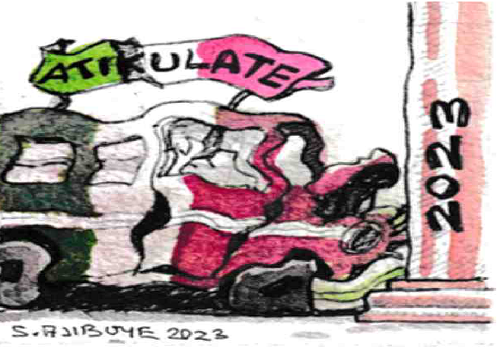FREDERICK NWABUFO FROM PREMIUM TIMES
That the Labour Party has 40 seats in parliament today is not a guarantee of political sustenance or survival in the long run.
The Labour Party appears uninoculated against the APGA contagion. The party is becoming rigidly ethnicised. Ethnic irredentists have seized the party, branding it after themselves – recreating it in their own image. Some of these irredentists who take up residence on social media are quick to establish they “own” the Labour Party, shutting out divergent interrogations.
It may just be a bubble. A phantasm. An ignis fatuus. A castle on quicksand. It may not take long before the house caves in. The Labour Party electoral rendition is a thrilling experiment of what could be; of political possibilities, of change, but it appears the party is doomed to crumple under the weight of its own afflictions and internal contradictions.
The Labour Party has won 40 National Assembly seats so far – according to records by the Independent National Electoral Commission (INEC). Peter Obi, presidential candidate of the party, put up a notable performance in the presidential election, though there are disputations over votes from the states he won, as there are allegations that they were ballooned in his favour.
But are these sputters of fortune enough to keep the party afloat? I think not. The party is becoming vigorously ethnicised, rigid, and anti-intellectual. I believe the party may end up like the All Progressives Grand Alliance (APGA) – a failed experiment and poor attempt at building a people’s forum.
There is no guarantee that those who were swept into parliament on the wave of juvenile anger, will remain in the party afterwards. And even if some of them do, there is no certainty that the same wind will blow again in subsequent elections.
At parliament, the beneficiaries of the “Obi phenomenon” will fight for survival, opportunities, and trade interests. There is the likelihood that some of them will cross into other parties for whatever interest they hold.
So, that the Labour Party has 40 seats in parliament today is not a guarantee of political sustenance or survival in the long run. It is not a guarantee of anything. The party remains a rustled-up vehicle without organic and deep roots. It lacks intellectual bearings, and its supporters are vacuous, angry, and menacing. It is only held together, at the moment, by youthful anger, but what happens when the rage tapers off?
The much-vaunted Obi phenomenon will fizzle out as soon as the elections are done, and the youth have other worthy distractions. I do not see Peter Obi sustaining the momentum long after the elections. He may retreat to his business and wait for another happenstance. It is the reason I said it will be historic if Obi extends a hand of fellowship to the president-elect, Asiwaju Bola Ahmed Tinubu, rather than chasing apparitions and chest thumping while at it.
APGA used to be that party. The third leg. It held some promise. The party came on stream as democracy returned to Nigeria in 1999. It won some elections. But over time, the party became rigidly regional. It became defiant to political evolution. While the Action Congress of Nigeria (ACN), which was founded much later in the 2000s, was able to build from its base to the centre by attuning itself to the times and evolving accordingly, APGA was closed and straitjacketed.
APGA lost its oomph and quickly took on the brand of a sectional party. The dream of the revered Igbo leader, Odumegwu Ojukwu was for the party to become a national brolly – a stamping ground for all Nigerians. To build from the base and levitate to the centre. But the party failed to realise this dream. It was racked by internecine squabbles, greed, lack of foresight by subsequent managers, insularity, and sabotage.
The Labour Party appears uninoculated against the APGA contagion. The party is becoming rigidly ethnicised. Ethnic irredentists have seized the party, branding it after themselves – recreating it in their own image. Some of these irredentists who take up residence on social media are quick to establish they “own” the Labour Party, shutting out divergent interrogations.



